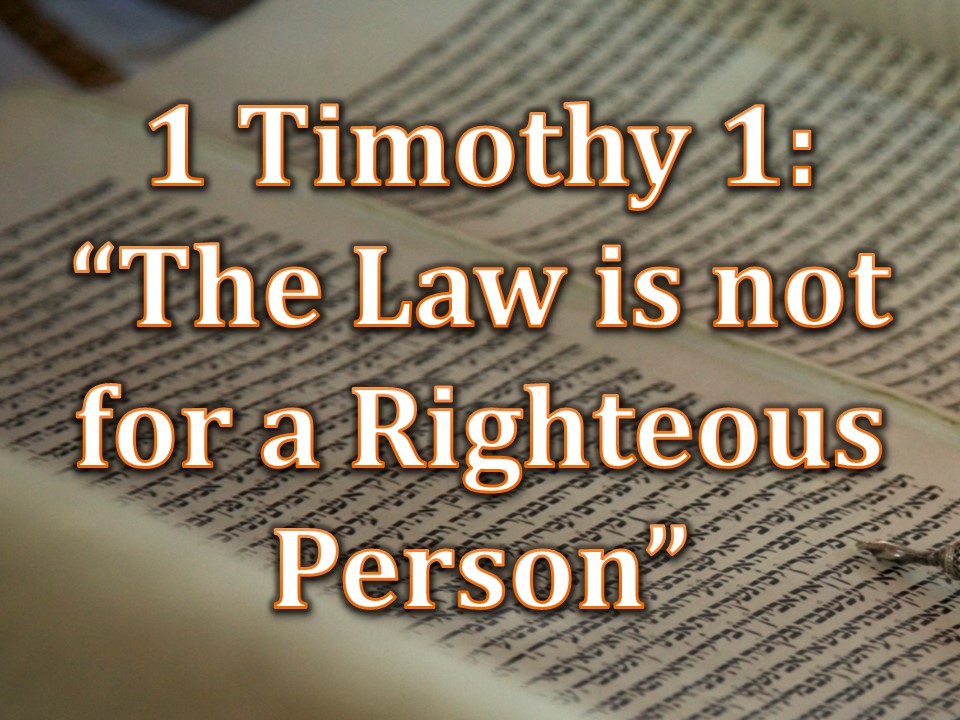This is a study on the first chapter of Timothy, a chapter sometimes used to in response to anyone who believes we should observe Yahweh’s commandments in the Torah/law. (En Español)
1 Timothy 1:1- Paul, an apostle of Yahushua the Messiah, by the commandment of Elohim our Savior and the Master Yahushua the Messiah, our hope,
2 To Timothy, a true son in the faith: Grace, mercy, [and] peace from Yahweh our Father and Yahushua the Messiah our Master.
Whenever we read one of Paul’s epistles that it is very important to note who he is writing to. Here, he is writing to Timothy.
3 As I urged you when I went into Macedonia–remain in Ephesus that you may charge some that they teach no other doctrine,
4 nor give heed to fables and endless genealogies, which cause disputes rather than righteous edification which is in faith.
It is abundantly clear that Paul is concerned for that Assembly in Ephesus would not be taught false doctrines. He lists two of them, fables and endless genealogies.
There is a such thing as “Jewish fables” such as those which Paul mentions in Titus 1:14. But these are doctrines of men like what can be found in the Talmud and oral tradition, not the law of Yahweh. There are also many mythological doctrines in Greek paganism.
Concerning the genealogies, Philo, a learned Alexandrian Jew who wrote a little before Paul’s time, built up a whole system on genealogies. The names in the genealogies with him represented the various conditions of the soul.
So we can see that these items that Paul listed have nothing to do with the doctrine of keeping the law of Yahweh. Rather, the very opposite!
There are no fables or endless genealogies in Yahweh’s word. The genealogies that do exist in the scriptures are there for a good purpose. Matthew 1 and Luke 3 also contains genealogies.
Continuing..
5 Now the purpose of the commandment is love from a pure heart, [from] a good conscience, and [from] sincere faith,
6 from which some, having strayed, have turned aside to idle talk,
7 desiring to be teachers of the law, understanding neither what they say nor the things which they affirm.
8 But we know that the law [is] good if one uses it lawfully,
It is truth that the purpose of the law is love. Indeed, Yahushua affirms this when He said:
Matt 22:38-40 (NKJV) “This is [the] first and great commandment. And [the] second [is] like it: `You shall love your neighbor as yourself.’ On these two commandments hang all the Law and the Prophets.”
The law is useless when taken in a selfish approach rather than in a mindset of love. This was the mistake of some Scribes and Pharisees.
They had lost sight that the Torah was intended to be instruction of how to love Yahweh and to love one another, not a prescription for exalting yourself above others.
9 knowing this: that the law is not made for a righteous person, but for the lawless (459) and insubordinate, for the ungodly and for sinners, for [the] unholy and profane, for murderers of fathers and murderers of mothers, for manslayers,
10 for fornicators, for sodomites, for kidnappers, for liars, for perjurers, and if there is any other thing that is contrary to sound doctrine,
11 according to the glorious gospel of the blessed Elohim which was committed to my trust.
So the law was not made for those who are righteous but for those who are ‘lawless’. What is the meaning of this word which comes from the Greek word ‘anomos’?
Thayers Greek Lexicon # 459 anomos {an’-om-os}from 1 (as a negative particle) and 3551; TDNT – 4:1086,646; adj
AV – without law 4, transgressor 2, wicked 2, lawless 1, unlawful 1; 10
1) destitute of (the Mosaic) law
1a) of the Gentiles
2) departing from the law, a violator of the law, lawless, wicked
So the Torah/law was made for those who do not obey Yahweh. Those who do not obey Yahweh choose to be “destitute of the Mosaic law!”
Now if people are never taught to repent for breaking the Sabbath, eating unclean animals, profaning the name of Yahweh, ignoring the holy days of Yahweh and submitting themselves to idolatrous practices with the so-called ‘Christian’ holidays along with other clear transgressions of the law, how can they know that they need to repent of these things?
It is truth that those who commit these sins are in need of the law of Yahweh to correct them. But those who do not sin in these matters are in no need of a law to correct them. And if a person has not repented of these sins, then they must certainly ask for forgiveness and get it under the blood of Yahushua just as they would any other sins.
Most people today do not believe it matters much if they break the Sabbath or ignore the other commandments I previously listed. But failing to keep these commandments is even more important than other commandments that deal with how to love our neighbor.
Why? Because the greatest commandment is to love Yahweh. And the second greatest commandment is to love our neighbor.
Paul also said the law was made for ‘sinners’. What is a scriptural definition of sin?
1 John 3:4- Whoever commits sin also commits lawlessness (459), and sin is lawlessness. (459)
Here is that same Greek word “anomos” being used again. Sin is breaking or being destitute of the (mosaic) law. The Strong’s lexicon definition even says that this word means to be “not subject to the (Jewish) law”.
According to this scripture, failing to subject yourself to this law is the very definition of sin!
Now if you never repented for breaking these commandments written in the law, it is now the time to do so.
Let us go and sin no more!
